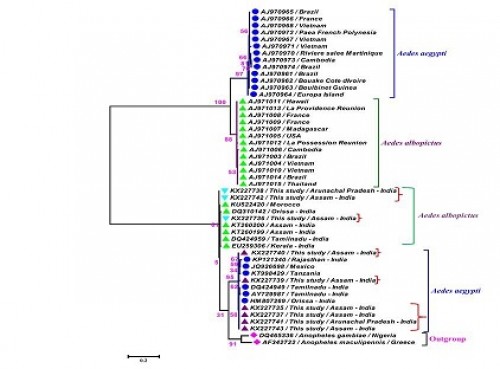DNA barcoding as a complementary approach for species identification from dengue endemic regions of North East India
Author(s): Monika Soni, Chandra K Bhattacharjee, Siraj Ahmed Khan and Prafulla Dutta
Abstract: Aedes aegypti and
Aedes albopictus are rapidly expanding mosquito vectors responsible for transmitting Dengue, Chikungunya, Zika and Yellow fever. Regional climatic factors can trigger species drift consequently influencing epidemiological consequence. Though morphological identification is still widely adopted method of species identification, limited resources and absence of taxonomic expertise can adversely impact result outcome. The present study highlights resolution offered by DNA barcoding in species identification.
Results found Aedes aegypti as dominant and abundant vector species in urban areas. Sequence of Aedes albopictus shows 100% similarity whereas sequence of Aedes aegypti shows 99.77 - 100% similarity of COI gene when compared with BOLD database search. However, phylogeny revealed two clusters of each species based on similarity search, separating native population with rest of globe. Intra species divergences between two taxa, were found to be 0-2.6% and 0.5% respectively.
 Fig.:
Fig.: Explains about the phylogenetic tree of sequences from mosquito species from Assam and Arunachal Pradesh (highlighted by red curly bracket) in this study and sequences downloaded from databases using MEGA6 and K2P model.
How to cite this article:
Monika Soni, Chandra K Bhattacharjee, Siraj Ahmed Khan, Prafulla Dutta. DNA barcoding as a complementary approach for species identification from dengue endemic regions of North East India. Int J Mosq Res 2018;5(1):46-52.



